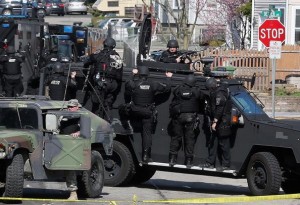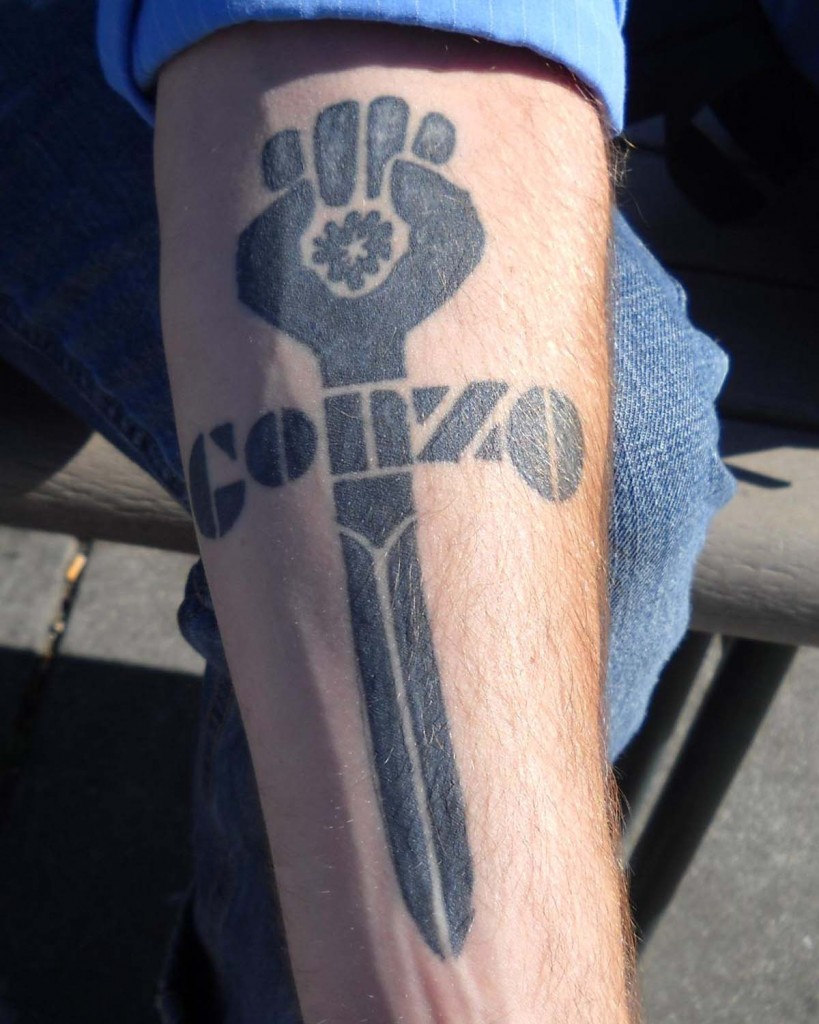Author’s note: Despite all of the confusion, questions, contradictory news reports and conspiracy theories regarding the Boston bombings, one thing is clear. The police state created under Bush and continued under Obama utterly failed the people of Boston on April 15, 2013.
Full text:
“Those who would give up essential liberty to purchase a little temporary safety deserve neither liberty nor safety.”
Benjamin Franklin, Historical Review of Pennsylvania, 1759
Since 9/11, Americans have willingly sacrificed constitutional rights, personal freedom, billions of taxpayer dollars and lives in order to feel safer from terrorist acts. The horrific bombing in Boston is an ugly reminder that such sacrifices are not keeping Americans safer.
Even though the suspects were found within days after the bombing, the surveillance and police state that Americans have allowed to be created utterly failed on April 15th, 2013. Indeed, over 250 years later, the words of Benjamin Franklin ring true.
Some are questioning the official narrative of the Boston Marathon bombing and the ensuring events in the five days that followed. That is to be expected when the official story seems so improbable in light of all the anti-terrorism measures that have been enacted over the past 12 years. If one believes that story, however, it should become clear that all of the rights that Americans have sacrificed, all of the tax dollars spent, and all of the lives lost in the “war on terror” have done nothing to keep Americans safer from terrorist attacks.
The American people are told that they need Echelon, the CIA, the NSA, the DHS, the TSA, fusion centers, tracking devices, RFID chips, drones, spy satellites, militarized police armed like Marines, and a defense budget that accounts for over 41% of world military spending – more than the next 10 highest spending nations combined.
Americans are told that they need indefinite illegal detention, illegal torture prisons that provide no reliable intelligence that can be acted upon, gun control, pre-crime arrest, a stifling of freedom of speech and expression, a means to bypass Miranda rights, control of every channel of communication, censorship of the media, complete control of the internet, etc. – all in order to prevent terrorist attacks and keep them safe.
Americans are told they need to make sacrifices in taxes, Social Security, Medicare, health care, education, jobs, infrastructure, and even lost lives in the military in order to keep them safe from “terrorists.” As a cowed and misinformed population willingly makes these sacrifices, the constitutional rights of common Americans are being shredded, their freedoms disappear and the nation is spent into bankruptcy as an all-powerful police state is expanded in an Orwellian fashion.
Despite all the sacrifices, two seemingly ordinary young men, ages 26 and 19, acting independently, were able to elude hundreds of police, federal agents, bomb-sniffing dogs, surveillance cameras, internet surveillance and even their own family and friends in order to set off two makeshift bombs and that killed three people and wounded over 200, evading capture for almost five days in a city of 650,000 people.
Before the suspects were caught, it took a plea to the public from the F.B.I. to identify them from a grainy department store surveillance camera still shot, a manhunt during which hundreds of rounds of gunfire were unleashed in a crowded city, a virtual martial law lockdown of thousands of Americans, house-to-house searches (see video below) and a cost of an estimated $333 million in expenditures and lost income in Boston.
Many details have been reported and later contradicted about the events between April 15th and April 19th, the background of the suspects and the manner in which authorities handled the situation. The full truth may never be known.
One thing certain, however, is that at least one of the suspects was on the F.B.I.’s radar before the bombings. The F.B.I. originally denied first meeting with one of the bombing suspects, Tamerlan Tsarnaev, two years ago, but finally admitted that after CBS published the information. There have been several allegations that the F.B.I. interviewed the elder bomber multiple times.
At the very least, that would mean that the F.B.I. would have run a background check on him and run his name and photos through all the available surveillance databases that federal agencies have created with taxpayer funding. Reuters reports that was done and that Tamerlan Tsarnaev was put on a terrorist watch list. Yet the public was asked for assistance in identifying him, which raises some questions.
There are only two possible conclusions based on those facts: Either the F.B.I. was utterly incompetent in preventing a terrorist attack by someone they monitored, or they are covering up that they were instigating and handling the bombing plot, like they have done with many others in the past, and this one got out of hand. Perhaps even a combination of both.
Another certainty is that a lot of security was in place at the bombing site before the bombs went off. Three of the security measures that have been documented to have been used at the finish line are bomb-sniffing dogs, a bomb drill and extra security provided by the National Guard, including the Weapons of Mass Destruction – Civil Support Team (CST).
So much security, in fact, that many “conspiracy theories” that the bombings were staged can be found on the internet. Along with the many unanswered questions, that is not surprising. The only way to prove that the official story is fabricated, however, would be through a serious investigation entailing filing state records act requests, Freedom of Information Act requests at the federal level, as well as obtaining the search warrants, affidavits and a whole lot more. Since authorities are obviously unwilling to release such information at this time, it is best to simply stick with the facts that are available.
The available “facts” are that despite a plethora of security, foreknowledge of the potential of one of the bombers to have a propensity for terrorism, billions of dollars of spending on homeland security, a 26-year-old and a 19-year-old were able to succeed in committing a terrorist act that killed and maimed innocent Americans. Then they managed to cause a large city to be transformed into a virtual martial law war zone after one was killed and before the other one was captured.
That can only be described as a failure of the surveillance, police state that Americans have made so many sacrifices for.
The real questions to ask may be: Where is this going to take America from here? Is the nation going deeper into the abyss of defense spending, more surveillance and further loss of constitutional liberties? Is homeland security designed to protect Americans under constitutional law or is it designed to protect the establishment’s power over the Constitution? Will over 200 years of laws and legal precedents be scrapped whenever a suitable event occurs or an excuse can be contrived? Who benefits from that, defense contractors, security firms, weapons and surveillance technology manufacturers, the elitists who run police states, or common Americans?
Obviously, the victims in Boston did not benefit from that. If the police state was designed to protect average Americans, then it has failed.
Get links, a slideshow and a video here: Madison Independent Examiner – The Boston Marathon Bombing: Failure of the police state







Ernie Pyle or Herb Caen?
San Francisco named a street for a famous local columnist
[Note: The annual task of writing something to be posted honoring National Columnists’ Day on April 18, which was the day that war correspondent/columnist Ernie Pyle was killed in action on the island of Ie Shima in the Pacific Theater of WWII, is always a challenge because the intention is to keep the tone lighthearted and upbeat but this year, because it falls at a time when the national mood is very somber, we will, after a moment of silence, proceed with this year’s installment, for the same reasons that Boston will hold their marathon again next year.]
A hint of scandal for this year’s America’s Cup Races in the San Francisco Bay area will provide us with a chance to examine how two of our favorite columnists might take different approaches displaying their unique styles to the task of informing their readers of the looming potential for an economic blunder with dire implications for the taxpayers in the town Herb Caen dubbed “Baghdad by the Bay.”
While preparing to write this year’s installment of our annual National Columnists Day posting to mark the day which honors both war correspondent Ernie Pyle and the vocation of being a columnist, we decided to focus this year’s effort on legendary San Francisco scribe Herb Caen who served in the Army Air Force during WWII.
Pyle wrote from the point of view of the G. I. in the foxhole, while Caen, in his civilian phase, preferred to let his audience participate vicariously in his life as a flâneur, a boulevardier, and a bon vivant, who hung out with and traded gossip with “the swells.” Caen’s first effort was published on July 5, 1938, and ended with his last column in 1997.
Obviously if both of them were still alive and churning out words, they would both take very different approaches to the growing grumbling about the Americas’ Cup races scheduled to be held later this year on San Francisco Bay.
The race’s lawyers seem to have outwitted the ones working for the San Francisco Board of Supervisors and so the two parties signed a deal that, upon closer reading, will leave the citizens liable for a large financial shortfall.
We assume that Caen would look forward to rubbing elbows with the “swells” who will conduct the races and hold the accompanying “invitation only” parties and maybe he would also describe the spectacle as seen from a private airplane flying overhead. Isn’t it logical to conclude that Pyle would side with the taxpayers who can only use binoculars to see some (three?) sailboats on the bay?
Caen’s pioneering approach to celebrity journalism made him a star in the ranks of columnists. He coined the word “beatnik” and quite often his witty way with words won him a mention in the monthly “towards more picturesque speech” feature in the Readers’ Digest.
Caen was a staunch supporter of iconoclastic wit and provided a continuing source of publicity to Lenny Bruce for his pioneering efforts in the realm of “sick” humor.
In addition to honoring and remembering Ernie Pyle each year, the day is also intended to draw attention to the career of being a columnist, which in the Facebook era should make Pyle the Patron Saint of Facebook, since the mission statement for a columnist is essentially the same motivation for churning out the keystrokes for a Facebook page, i.e. tell the world what you are doing and thinking. Ernie Pyle, Herb Caen, and Bill Mauldin all have a Facebook page.
Can a Facebook blurb make or break a restaurant? Once, many moons ago, Caen wrote a blind item blurb about a restaurant that incurred his wrath. After it was published, the owner of another restaurant that fit the vague description of the offending culprit, contacted Caen’s office and begged him to explain that their restaurant, which had suffered a consequent crippling of their usual business level, was not the one that folks should boycott. He immediately cleared up the misperception. Can a Facebook writer have that big of an impact on a community?
The fact that Caen’s style of quick verbal jabs was dubbed “thee dot journalism,” because he used the punctuation of three dots (called an ellipse) to separate items, preceded the Internet phenomenon of catering to an audience with an attention span that demanded items with the complexity level of a bumper sticker and that should endear him to the new generation that operates with a self imposed 130 word limit. For example, isn’t just the fact that Anthony Grafton wrote a scholarly book, title “The Footnote a Curious History,” enough information for a great Herb Caen-ish column item?
A fellow who went AWAL from a military hospital, three weeks after the liberation, and went into Paris with a nurse who spoke French told us about going into a fine restaurant and ordering a “once in a lifetime” meal. When the fellow asked for the bill, management considered it a matter of honor to refuse to let the sergeant pay for the meal. We like to think that Ernie Pyle, if he heard about it, would have devoted a full column to that incident. He would (we assume) have compared and contrasted the best that Paris had to offer with the famed K-ration that the GI’s often disparaged with very salty language. (If the disk jockey is alert he will play “Moose Turd Pie” as part of the “outro” music at the end of this column.) Herb Caen, who served in WWII, was a gourmet who savored fine meals and shared his enthusiasm with his readers.
Many Facebook entries include a snapshot of a meal. Would young folks appreciate the subtlety if an Ernie Pyle wannabe posted a photo of a K-ration being served?
Once, according to an anecdote provided by one of Caen’s contemporary rivals in the realm of column writing, the two competitors for the right to the title of “Mr. San Francisco,” were out cavorting in some fog city bars after WWII. They became a bit rowdy and a rookie policeman started to arrest them. They simultaneously asked if the youngster knew who he was trying to arrest. He didn’t know and didn’t care. He led them down to the local station. When the trio entered, the desk sergeant began to laugh boisterously and asked the newcomer: “Do you know who you are trying to arrest?” Case dismissed!
The San Francisco Chronicle would, when Caen was on vacation, run a box on the front page above the fold saying “Herb Caen is on vacation” to cut down on the number of complaints from people who would call and bitch about not being able to find that day’s installment of the column simply titled “Herb Caen.”
Once, back in the season when the Oakland Raiders won games when George Blanda would kick a last second field goal, a reporter for the Tahoe Daily Tribune rushing a “starter” copy of the day’s publication, noticed that at the beginning of the lead story, the words indicated that the story was about the will a local celebrity had written “after” he died. The ME had a “Stop the presses!” moment and the word was quickly changed to “after” and one of the typesetters was given a stern lecture about the rule that only editors could change copy. The incident was quickly forgotten until the next week when the secret goof-up was prominently mentioned in Herb Caen’s column.
According to Barnaby Conrad, in his book “The World of Herb Caen,” the Frisco phenomenon produced enough columns of approximately 1,000 words (about three takes) that Caen’s lifetime total would verify this boast: “If laid end to end, his columns would stretch 5.6 miles from the Ferry Building to the Golden Gate Bridge.”
At the height of his popularity Ernie Pyle was read by approximately 3 million readers nationwide.
Facebook posters might note with extreme envy that in his prime, Caen received 45,000 letters a year. Isn’t a fan letter better than a quick “like” click?
Herb Caen wrote: “If I do go to heaven, I’m going to do what every San Franciscan does who goes to heaven. He looks around and says, It ain’t bad, but it ain’t San Francisco.”
Now the disk jockey will play the “Vertigo” soundtrack album, the “Moby Grape” album, and the Jefferson Airplane’s “Surrealist Pillow” album. We have to go reread Ernie Pyle’s very gruesome and lugubrious columns written on the Normandy Beach (as foud in the Random House book “Ernie’s War: the Best of Ernie Pyle’s World War II Dispatches” edited by David Nichols) immediately after the D-Day Invasion. Have a “soldier on” type week.